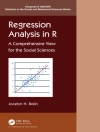Confronting Poverty is a text that introduces students to the dynamics of poverty and economic hardship in the U.S. It address four fundamental question: 1) What is the nature, prevalence, and characteristics of poverty; 2) Why does poverty exist; 3) What are the effects and consequences of poverty upon individuals and the wider society; and 4) How can poverty be reduced and alleviated?
In clear and engaging writing, Confronting Poverty provides students with the most up-to-date research and thinking regarding American poverty and inequality. It includes the many insights of the author’s 30 years of writing and teaching on the subject. It is designed to be used as either a primary or secondary text in a wide range of courses across academic disciplines.
In addition, Confronting Poverty makes use of an innovative companion website developed by the author. The focal point of the website is an interactive tool, called the Poverty Risk Calculator, that has been constructed with hundreds of thousands of case records extracted from the Panel Study of Income Dynamics (PSID) data set. The website also includes a discussion guide on various aspects of poverty along with many other interactive links and activities (short documentary films, video interviews and lectures, interactive data sources, research briefs, magazine and newspaper articles). Each chapter includes an on-line activity from the companion website for students to engage in, resulting in a dynamic learning experience.
Inhaltsverzeichnis
Part I: Nature, Extent, and Characteristics of Poverty
Chapter 1: Defining and Measuring
Chapter 2: Patterns and Dynamics
Chapter 3: The Face of Poverty
Part II: Reasons for Poverty
Chapter 4: Individual and Cultural Level Explanations
Chapter 5: Structural Level Explanations
Chapter 6: Putting It Together – Structural Vulnerability
Part III: Effects and Consequences of Poverty
Chapter 7: Individuals and Families
Chapter 8: Communities
Chapter 9: The Nation
Part IV: Addressing and Alleviating Poverty
Chapter 10: Strengthening the Social Safety Net
Chapter 11: Increasing Access to Key Public Goods and Services
Chapter 12: Supporting All Families
Chapter 13: Employment and Universal Basic Income Policies
Chapter 14: Organizing for Social Change
Chapter 15: Conclusion – Confronting Poverty by Empowerment
Über den Autor
Mark Robert Rank is the Herbert S. Hadley Professor of Social Welfare in the George Warren Brown School of Social Work at Washington University in St. Louis, as well as Professor in the Department of Sociology. He received his Ph.D. in sociology from the University of Wisconsin. He is widely recognized as one of the foremost experts in the country on issues of poverty, inequality, and social justice. His research on the life course risk of poverty has been groundbreaking, demonstrating for the first time that a majority of Americans will experience poverty at some point during their lives. To date he has written 10 books on a range of related subjects, including a new understanding of poverty and inequality, an exploration of the American Dream, and the role of luck and chance in shaping the course of our lives. In addition, he has published articles in numerous academic journals across a wide variety of fields. Dr. Rank’s research has been reported widely throughout the news media. His work has been cited in virtually every major newspaper in the country including The New York Times, The Washington Post, The Wall Street Journal, The Los Angeles Times, USA Today, and dozens more. His expertise has also been featured in other media outlets including various programs on National Public Radio (Morning Edition, To the Best of Our Knowledge, Marketplace, All Things Considered), NBC Nightly News, the Chronicle of Higher Education, and many others. In addition, he has provided his research knowledge to members of the U.S. Senate and House of Representatives, as well many national organizations involved in issues of economic and social justice. In a landmark 2013 speech on economic mobility, President Barack Obama directly referenced Rank’s research on the life course risk of poverty. In addition, other well-known politicians have referred to Rank’s work including Senator Bernie Sanders and former Secretary of State Hillary Clinton. Prof. Rank’s influence has also extended into the wider general population. He has developed a website (Confronting Poverty) that allows users to explore in greater depth the issues of poverty and economic inequality. Its centerpiece is the creation of an innovative poverty risk calculator. To date, the website has over 1 million page views, and has had visitors from more than 200 countries. It is also being used in universities and high schools across the country, along with various social justice and community organizations.












